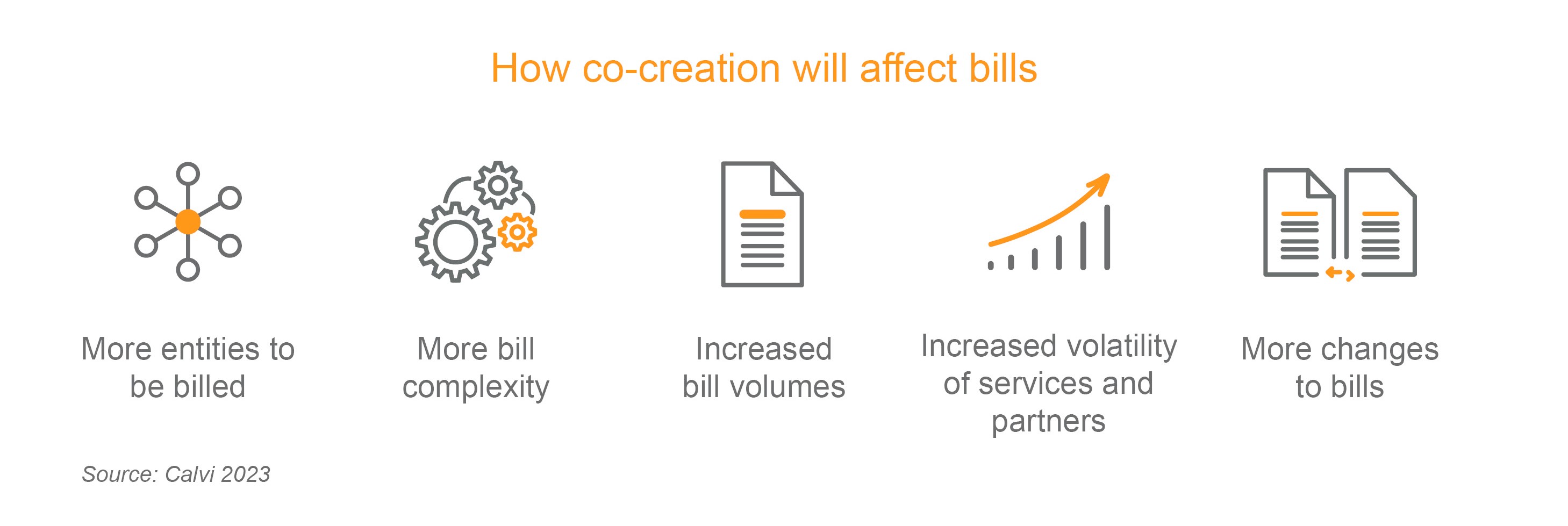How co-creation will impact the bill - the billers' perspective
18 January 2023
|
Rob Vos
As CSPs become increasingly interested in the opportunities presented by the Co-Creation Economy, Rob Vos looks at how their ambitions will affect their bills.
The co-creation opportunity for CSPs
Co-creation, a form of mutual digital value creation resulting from collaborative innovation processes, provides a huge opportunity to boost CSP success (as outlined in my recent blog). CSPs that get co-creation right can build a new role for themselves as not just participants in the Co-Creation Economy, but as the monetizers of co-creation ecosystems - handling the complexity of billing and charging for all participants and thereby creating new revenue streams for themselves. This transforms billing from a cost center (a necessary part of doing business) to an enabler of co-creation and even a revenue-generating opportunity.
Well-designed bills are part of the challenge of addressing the co-creation opportunities being presented. To successfully provide key monetization and support services, CSPs must constrain the cost of support and prevent their support staff from becoming overwhelmed by inquiries. If they don’t do this, not only will it negatively impact customer and partner satisfaction, but will ultimately impede the success of co-creation ecosystems. Clear, trustworthy, and well-designed bills minimize customer inquiries by making it easier for customers to find and understand the information they need, thereby reducing bill processing effort.
To ensure their support for monetization and customer service is an enabler of co-created products and services and not a barrier, CSPs will need to address 5 key challenges.

Challenge 1: the number of parties needing to be billed will increase
To understand why co-creation increases the number of parties that need to be billed, let’s remind ourselves what it looks like in practice. Take the emerging drone business as an example. Towercos and MNOs, such as Rakuten, have co-created drone solutions in conjunction with software firms, AI providers, and drone companies to make inspecting telecoms towers safer, cheaper, and more effective. The same technology can be adapted (through co-creation or traditional tailoring) to the needs of electricity companies, oil & gas firms – in fact, any B2B customer that needs to inspect and maintain complex external equipment on a regular basis.
But, as can be seen in this example, while co-creation boosts innovation and enables the precise tailoring of products and services, it also means more parties are involved in the delivery of the service, which therefore have to be paid and/or charged.
Challenge 2: bill complexity will increase
Standard B2B billing is already complex – especially for larger and multi portfolio customers. Creating an enterprise bill requires CSPs to combine the charges for multiple products and services used by large numbers of employees across various departments and locations. They must ensure the resulting bill is clear and easy to process, or customers will become frustrated – hiking customer care costs and driving churn.
As CSPs begin to experiment with new business models – such as co-creation – the complexity of B2B bills is set to rise even further. New models such as co-creation have novel requirements that bills will need to accommodate, such as more complex supply chains. Bills may be an exchange of charges (where each partner bills others for the services or products it supplied) or net bills where the bill summarizes what was supplied, what is owed, and the difference between the two that needs to be paid (so-called ‘netting off’).
Pricing and discounting models will also become more complex and personalized, including new parameters such as quality, latency, and personalized discounts. CSPs will therefore require highly flexible support for pricing and discounting, and their bills will have to accommodate all this added complexity without confusing their customers.
Challenge 3: increased volume of bills
With more entities to bill, more complex bills, and more changeable bills, the volume of bills and billing data is set to rise. This will make it increasingly difficult, if not impossible, to manage billing in the traditional way (such as paper or PDFs sent by e-mail) and will push CSPs towards adopting digital bill formats which make it easier for customers and partners to check their balances and manage the increasing volume of bills. Digital billing has the added advantages of being better for the environment and enabling CSPs to provide real-time balances to their customers and partners.
Challenge 4: increased volatility of services and partners
Service volatility is going to increase, with shorter service lifecycles and a far wider range being offered. Likewise, partner lifecycles may be shorter – requiring CSPs to be able to onboard and bill partners easily. This means bills must be easily adjustable, and connecting new partners cannot be a long-winded integration project, but must be enabled via easy and fast configuration.
Challenge 5: bills, as well as products, will be affected
Discussion of co-creation tends to focus on product innovation and how we support that, but what’s frequently overlooked is that co-creation equally applies to the bill itself.
Customers will want to be able to adapt bills to their own needs in terms of:
-
Frequency – some customers will need more frequent bills, others on-demand bills, and some will still prefer traditional monthly bills. Most customers are likely to want to be able to check real-time balances of what they’re owed or owe
-
format – customers will want their bills delivered in various formats, including PDF, Excel, and UBL (e-invoice). E-invoicing, for example, offers the possibility of easier processing and more flexible reporting
-
extent – will vary between those requiring a single bill for everything versus those who require a bill for a specific location, department etc
-
detail – some customers might only require a summary bill; others will need an itemized bill; some may need varying amounts of detail depending on circumstances. The ability to drill down through bills to discover more detail will become even more important than it is today
-
channels – to meet customer need, CSPs will have to support a widening range of channels – including Peppol, social media (such as WhatsApp), RCS, and Apple Business Messaging, as well as new channels that will emerge as co-creation evolves.
In short, co-creation will accelerate the demand for personalized bills, the requirement for greater clarity and trust. While it undoubtedly represents an exciting new opportunity, CSPs will need to ensure vital support systems such as billing and bill presentment are ready to support their ambitions.
As monetization becomes more open, flexible and personalized, CSPs will need to be able to combine their own products with those from multiple partners into one (or more) billable charge(s). To do this, they will need a modular monetization platform that supports easier integration via standardized API libraries and a bill presentment platform that enables the tailoring of bill experiences. Integration capabilities will need to evolve so that partners can be onboarded and removed easily. And presentment platforms will need to ensure compliance with any legal or regulatory mandates, while accommodating the individual needs of customers and partners in terms of bill formats, layouts, reporting and processing to reduce bill effort for all parties involved.
To find out more about what co-creation means in terms of bills and billing, why not check out the webinar we co-created with our partner Aria Systems, or contact one of our consultants to book a co-creation workshop.





